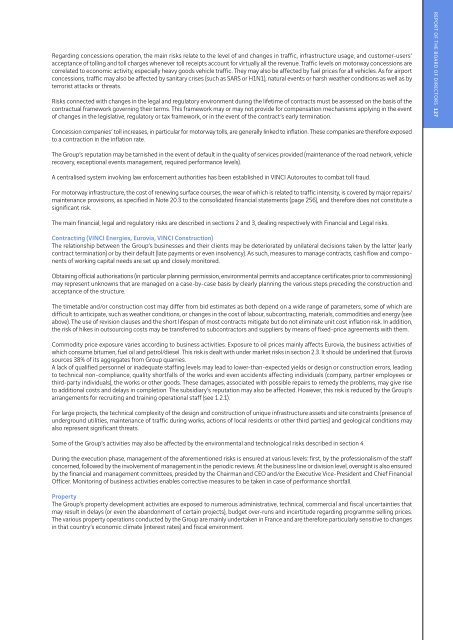2013-vinci-annual-report
2013-vinci-annual-report
2013-vinci-annual-report
Create successful ePaper yourself
Turn your PDF publications into a flip-book with our unique Google optimized e-Paper software.
Regarding concessions operation, the main risks relate to the level of and changes in traffic, infrastructure usage, and customer-users’<br />
acceptance of tolling and toll charges whenever toll receipts account for virtually all the revenue. Traffic levels on motorway concessions are<br />
correlated to economic activity, especially heavy goods vehicle traffic. They may also be affected by fuel prices for all vehicles. As for airport<br />
concessions, traffic may also be affected by sanitary crises (such as SARS or H1N1), natural events or harsh weather conditions as well as by<br />
terrorist attacks or threats.<br />
Risks connected with changes in the legal and regulatory environment during the lifetime of contracts must be assessed on the basis of the<br />
contractual framework governing their terms. This framework may or may not provide for compensation mechanisms applying in the event<br />
of changes in the legislative, regulatory or tax framework, or in the event of the contract’s early termination.<br />
REPORT OF THE BOARD OF DIRECTORS 127<br />
Concession companies’ toll increases, in particular for motorway tolls, are generally linked to inflation. These companies are therefore exposed<br />
to a contraction in the inflation rate.<br />
The Group’s reputation may be tarnished in the event of default in the quality of services provided (maintenance of the road network, vehicle<br />
recovery, exceptional events management, required performance levels).<br />
A centralised system involving law enforcement authorities has been established in VINCI Autoroutes to combat toll fraud.<br />
For motorway infrastructure, the cost of renewing surface courses, the wear of which is related to traffic intensity, is covered by major repairs/<br />
maintenance provisions, as specified in Note 20.3 to the consolidated financial statements (page 256), and therefore does not constitute a<br />
significant risk.<br />
The main financial, legal and regulatory risks are described in sections 2 and 3, dealing respectively with Financial and Legal risks.<br />
Contracting (VINCI Energies, Eurovia, VINCI Construction)<br />
The relationship between the Group’s businesses and their clients may be deteriorated by unilateral decisions taken by the latter (early<br />
contract termination) or by their default (late payments or even insolvency). As such, measures to manage contracts, cash flow and components<br />
of working capital needs are set up and closely monitored.<br />
Obtaining official authorisations (in particular planning permission, environmental permits and acceptance certificates prior to commissioning)<br />
may represent unknowns that are managed on a case-by-case basis by clearly planning the various steps preceding the construction and<br />
acceptance of the structure.<br />
The timetable and/or construction cost may differ from bid estimates as both depend on a wide range of parameters, some of which are<br />
difficult to anticipate, such as weather conditions, or changes in the cost of labour, subcontracting, materials, commodities and energy (see<br />
above). The use of revision clauses and the short lifespan of most contracts mitigate but do not eliminate unit cost inflation risk. In addition,<br />
the risk of hikes in outsourcing costs may be transferred to subcontractors and suppliers by means of fixed-price agreements with them.<br />
Commodity price exposure varies according to business activities. Exposure to oil prices mainly affects Eurovia, the business activities of<br />
which consume bitumen, fuel oil and petrol/diesel. This risk is dealt with under market risks in section 2.3. It should be underlined that Eurovia<br />
sources 38% of its aggregates from Group quarries.<br />
A lack of qualified personnel or inadequate staffing levels may lead to lower-than-expected yields or design or construction errors, leading<br />
to technical non-compliance, quality shortfalls of the works and even accidents affecting individuals (company, partner employees or<br />
third-party individuals), the works or other goods. These damages, associated with possible repairs to remedy the problems, may give rise<br />
to additional costs and delays in completion. The subsidiary’s reputation may also be affected. However, this risk is reduced by the Group’s<br />
arrangements for recruiting and training operational staff (see 1.2.1).<br />
For large projects, the technical complexity of the design and construction of unique infrastructure assets and site constraints (presence of<br />
underground utilities, maintenance of traffic during works, actions of local residents or other third parties) and geological conditions may<br />
also represent significant threats.<br />
Some of the Group’s activities may also be affected by the environmental and technological risks described in section 4.<br />
During the execution phase, management of the aforementioned risks is ensured at various levels: first, by the professionalism of the staff<br />
concerned, followed by the involvement of management in the periodic reviews. At the business line or division level, oversight is also ensured<br />
by the financial and management committees, presided by the Chairman and CEO and/or the Executive Vice-President and Chief Financial<br />
Officer. Monitoring of business activities enables corrective measures to be taken in case of performance shortfall.<br />
Property<br />
The Group’s property development activities are exposed to numerous administrative, technical, commercial and fiscal uncertainties that<br />
may result in delays (or even the abandonment of certain projects), budget over-runs and incertitude regarding programme selling prices.<br />
The various property operations conducted by the Group are mainly undertaken in France and are therefore particularly sensitive to changes<br />
in that country’s economic climate (interest rates) and fiscal environment.


